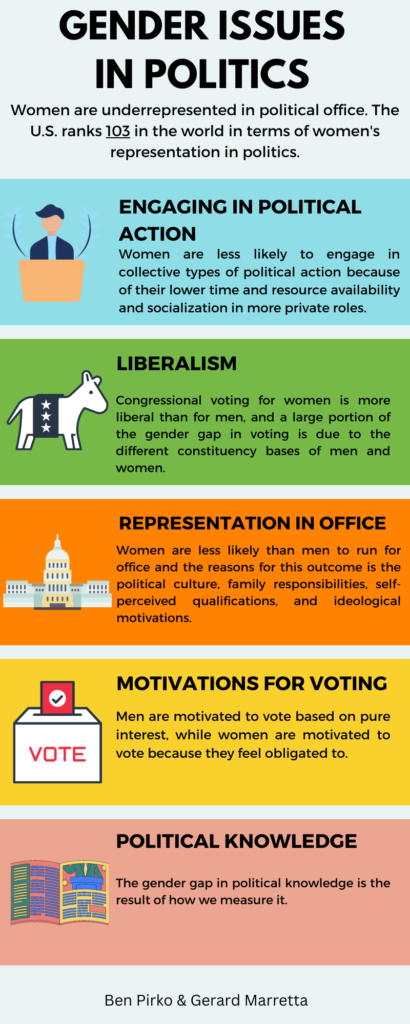By: Gerard Marretta & Ben Pirko
We have learned that gender is not a uniform lens that politics can be viewed through, and certain factors can impact each gender differently. After researching the history and causes of the gender gap in politics, we have found that there are disparities between men and women in many different areas related to politics. Areas of most interest are political action, political party identification, political representation in office, motivations for voting, and political knowledge. Relating to the gap in political action, since women engage in more private political activism than men, but politicians pay attention to the public actions, are policy decisions more reflective of male preferences? A future study should seek to find out how policy makers acquire their populations’ opinions and understand that political engagement is not about more or less when comparing between men and women but moreso, the difference in how men and women engage. In regards to political representation in office, self-perceived qualifications is the strongest predictor of women considering running for office so, future studies should examine if women perceive themselves to be more qualified as more women enter the field of politics. Similarly, are the current women in office now more qualified than their male counterparts since they perceive themselves to be more qualified when beginning the selection process? When analyzing the gap in political knowledge of men and women, we found that many surveys narrowly measure political knowledge and as a result, women are disadvantaged. Many U.S. surveys include a “don’t know” option which puts women at a disadvantage because women are more susceptible to choosing “don’t know” while men will simply guess. Additionally, women are at a disadvantage when having to identify (mostly male) elected officials on the surveys because women are significantly underrepresented in national politics. To make for a more accurate representation of political knowledge of men and women, we believe that a policy implication should be to remove the “don’t know” option from all political surveys. Without this policy implication, women will be perceived as less politically knowledgeable than men which is not accurate rather, a consequence of our system in place. We found that it is very interesting to see when the “don’t know” option is eliminated, women are equally knowledgeable on national-level electoral politics and rules of the game, as well as gender-relevant and state political information. Also that women are significantly more knowledgeable than men in terms of government programs and services, regardless of whether a “don’t know” option is available.
We have learned that women are underrepresented and misunderstood in American politics and this is largely due to the systematic structures and unconscious biases in our society.

Sources:
Coffé, H., & Bolzendahl, C. (2010). Same game, different rules? Gender differences in political participation. Sex roles, 62(5), 318-333.
Welch, S. (1985). Are women more liberal than men in the US Congress?. Legislative Studies Quarterly, 125-134.
Fox, R. L., & Lawless, J. L. (2004). Entering the arena? Gender and the decision to run for office. American Journal of Political Science, 48(2), 264-280.
Bennett, L. L., & Bennett, S. E. (1989). Enduring gender differences in political interest: The impact of socialization and political dispositions. American Politics Quarterly, 17(1), 105-122.
Miller, M. K. (2019). Who knows more about politics? A dual explanation for the gender gap. American Politics Research, 47(1), 174-188.